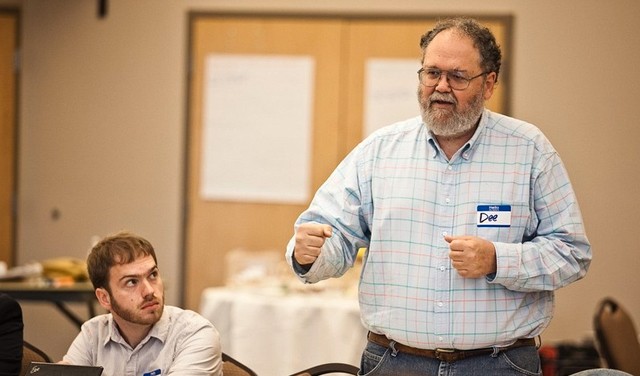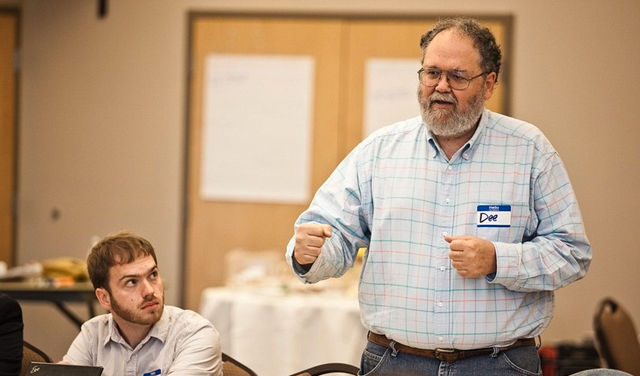
Rural Groups Call for Better Broadband Service

Some summit participants compared broadband to a basic necessity, like water.
In its relentless effort to take over competitor T-Mobile, AT&T has been dangling the promise of better service and greater access to broadband Internet to rural Americans as an incentive for policymakers to support and approve the $39 billion deal. But in eastern Kentucky, activists for rural broadband aren’t holding their breath and waiting for AT&T to make good on this promise.
Advocates from five states and Washington, D.C. gathered in Whitesburg, Ky. this week for the first Rural Broadband Summit and Hearing, cosponsored by the Center for Media Justice, the Center for Rural Strategies and Free Press.
They’re discussing issues at the heart of rural broadband expansion that are often overlooked in the Beltway debate: lower levels of access and use in rural areas and the often excessive cost to consumers for what is frequently inadequate service.
Participants represent groups working in arts and culture, health care, higher education, tribal issues, community development and community organizing. Participants hailed from Kentucky, Virginia, Tennessee, West Virginia, California and Washington, D.C.
“This is a unique mixture of people and groups,” said Edyael Casaperalta of the Center for Rural Strategies. “And it underscores how broadband affects so many different parts of our communities — economic development, education, health care, civic engagement, and cultural expression.”
Rural communities lag behind the rest of the nation in both broadband access and access speeds, and tend to have few or no choices among Internet providers. Even those who are lucky enough to have service typically experience slower download and upload speeds, according to a Daily Yonder analysis of data collected by the FCC and the National Telecommunications and Information Administration.
Summit participants discussed several policy solutions for improving broadband availability and access, including government assistance in encouraging greater investment. “There are some rural areas where a government subsidy could help bring in private providers,” said James Patterson of the West Virginia Partnership of African American Churches.
But there are other regions that will never attract private enterprise. “In those places there has to be an alternative,” Patterson said, like some kind of public investment in infrastructure.
Other summit participants advocated increasing competition by encouraging the creation of municipal and nonprofit networks in rural communities, an approach similar to the one taken by electrical and telephone cooperatives that wired much of rural America after private providers stopped expanding their networks to those areas.
Others compared broadband to a basic necessity, like water.
“We can’t just wait until providing Internet broadband to some rural communities becomes profitable,” said Mark Kidd of Appalshop, a Whitesburg-based arts and education center. “What if we had waited until it was profitable before we ran water and electricity to some rural areas?”
Event organizers said the concerns they heard about rural telecommunications were similar to what they heard in other parts of the country.
“Outrageous prices, poor service, decreased choice and few consumer protections are just some of the challenges community members face when it comes to the Internet,” said amalia deloney of the Center for Media Justice. “Rural communities are looking to the FCC to protect their interests — especially as it reforms the Universal Service Fund and considers the proposed acquisition of T-Mobile by AT&T. It’s clear that rural shouldn’t [bear] any more costs.”
The Universal Service Fund is a federal mechanism that helps defray the costs of telephone service to hard-to-serve areas. The FCC is currently considering changes to the fund that might improve broadband access.
Free Press Associate Outreach Director Misty Perez Truedson said telecoms needed to do more to serve rural communities with broadband.
“Broadband access is crucial to rural communities, which are among some of the hardest hit in the economic downturn,” she said. “But Internet service providers’ empty promises are not going to get Americans connected. We need real investment spurred by competition, and policies that put consumers ahead of the bottom line.
"Access to fast, affordable Internet service is what will help rural communities participate in the modern economy, not a bunch of hot air and promises that can’t be enforced.”
The rural broadband event continued on Wednesday with a public hearing on broadband policy. The hearing featured speakers including Jonathan Adelstein, director of the USDA Rural Utilities Service, which directs broadband and other infrastructure programs.
Tim Marema is the vice president of the Center for Rural Strategies, a Kentucky-based nonprofit that seeks to improve economic and social conditions for rural communities through the creative and innovative use of media and communications.